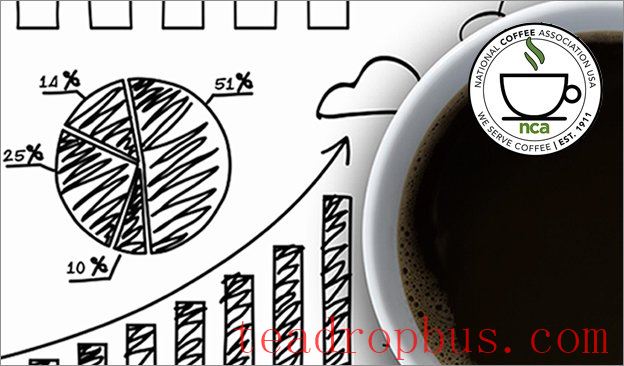
Specialty coffee consumption reaches historic highs as Americans embrace premium brewing culture, according to the latest report from the NCA. Photo credit: National Coffee Association
The latest National Coffee Data Trends (NCDT) Specialty Coffee Report, released recently by the National Coffee Association (NCA), reveals a remarkable transformation in American coffee consumption patterns. Coffee has been on a growth trajectory since 2020, and despite the economic uncertainty at the start of 2025, specialty coffee, according to the report, is sustaining at elevated levels. This marks a pivotal moment in the industry’s evolution.
The Numbers Tell the Story
The data speaks volumes about America's growing sophistication in coffee preferences. Fifty-five percent of Americans reported drinking a specialty coffee beverage in the past week, representing a 6% increase since 2020. This indicates a potential for continued growth in the specialty coffee segment, as an increasing number of consumers seek out espresso and non-espresso-based specialty coffee beverages.
According to the report, home brewers and prosumers are two consumer segments that no brand can afford to ignore. Now that a growing number of specialty coffee drinkers brew their own coffee at home, they are also more likely to consume it out-of-home as well, compared to traditional coffee drinkers. This demonstrates not just a trend but a fundamental shift in how Americans approach their daily coffee ritual.
The desire for diverse and specialized coffee experiences is also on the rise. Since 2019, consumers have been increasingly health-conscious, especially when purchasing specialty coffee beverages. While overall interest remains somewhat niche, in 2024, more specialty drinkers say they would buy a coffee that has added collagen, probiotics, or protein. Consumers are prioritizing health and functional benefits in the foods and beverages they consume.
The report also found that specialty coffee drinkers are aware of the health benefits associated with drinking coffee, with 61% stating that they believe coffee is good for their health. This aligns with the FDA’s new rule, which officially designates plain coffee as healthy for the first time.
Coffee Culture’s Impact
The broader coffee landscape continues to flourish, with overall coffee consumption reaching new heights. A growing number of Americans are consuming coffee daily, with the daily specialty coffee consumption at its highest level since 2020, with espresso-based beverages the most popular category. Cold coffee beverages are highly popular, even in winter. Cold brew accounts for 8%, and frozen blended coffee beverages account for another 8% of past-day consumption.
Grocery stores remain the most popular place to purchase coffee; however, the number of consumers who buy coffee online has doubled from 7% in 2020 to 14% in 2025. Drip coffee makers are most prevalent in American households, but single-cup brewers, instant coffee, bean-to-cup machines, and other brewing systems are also gaining popularity.
The average American drinks about two cups of coffee per day. However, for specialty drinkers, the average is three cups per day. This consumption pattern has helped coffee overtake bottled water as America's most consumed beverage, underscoring its cultural significance beyond mere caffeine delivery. Fifty-five percent of the people surveyed had at least one cup of specialty coffee in the past week.
Demographic Drivers and Market Forces
The specialty coffee surge is primarily driven by younger demographics (25-59 years), who are reshaping coffee culture through their preferences for premium, artisanal experiences. Younger consumers are more likely to drink specialty coffee (46%) compared to traditional coffee (36%). This generational shift reflects broader cultural changes, including increased awareness of coffee origins, brewing methods, and quality standards.
The growth in specialty coffee consumption isn't cannibalizing traditional coffee sales, suggesting that the market is expanding rather than simply shifting preferences. This parallel growth indicates that coffee culture is becoming more diverse and segmented, with room for both traditional convenience-focused consumption and premium specialty experiences.
The report also indicates shifting preferences for sweeteners, whiteners, and other additives, as well as an increasing interest in specialty drinks for a broader spectrum of beverages, including tea, flavored water, water with added vitamins or nutrients, and bubble tea.
Industry Implications and Future Outlook
The specialty coffee boom signals several significant trends for industry stakeholders. First, it validates the investment in premium coffee equipment, training, and sourcing that many retailers and food service operators have made over the past decade. Second, it suggests that consumers are willing to pay premium prices for quality coffee experiences, creating opportunities for differentiation in an increasingly competitive market.
The report's findings also highlight the importance of education and experience in driving specialty coffee adoption. As consumers become more knowledgeable about coffee origins, processing methods, and brewing techniques, they are increasingly seeking out establishments that can deliver authentic specialty coffee experiences.
Looking Forward
As Bill Murray, president and CEO of the NCA, noted in response to the findings, coffee holds a unique place in Americans' daily lives, with no other beverage serving as such a beloved and prominent touchstone. The data suggests that America's love affair with coffee will continue to evolve and deepen in the coming decades.
The specialty coffee industry's achievement in surpassing traditional coffee consumption represents more than statistical success — it reflects a cultural shift toward an appreciation for craft, quality, and experience. For industry professionals, this trend offers both validation of current strategies and a roadmap for future growth.